Overview
Coding challenges are a common hurdle for developers, often leading to delays and frustration. How can these issues be effectively addressed? Enter Kodezi, a powerful tool designed to automate the detection and resolution of coding problems. By streamlining the debugging process, Kodezi not only accelerates development but also enhances code quality.
Imagine reducing human error while improving your workflow. Kodezi achieves this by providing features that allow for quick identification of bugs and efficient fixes. This means developers can focus more on innovation rather than getting bogged down in troubleshooting.
The benefits of integrating Kodezi into your development process are clear:
- Increased productivity
- Higher quality code
- A significant reduction in the time spent on bug fixes
Furthermore, as modern engineering teams strive for efficiency, tools like Kodezi become essential assets in their toolkit.
Are you ready to elevate your coding practices? Explore the features Kodezi offers and see how it can transform your development experience. With Kodezi, you can embrace a more efficient coding environment and unlock your full potential as a developer.
Introduction
In the ever-evolving landscape of software development, coding challenges can significantly impede productivity and quality. These obstacles often lead to frustration and delays, underscoring the need for effective solutions. With the rise of AI-driven tools, developers now have access to innovative resources that not only automate bug fixing but also enhance overall efficiency.
Furthermore, Kodezi addresses these persistent coding obstacles by offering features designed to streamline the development process. By automating repetitive tasks and providing intelligent suggestions, Kodezi allows developers to focus on more complex problems, ultimately improving their workflow.
The benefits of using Kodezi are substantial; teams can expect increased productivity and higher code quality. As developers integrate these AI tools into their practices, they can overcome common pain points and elevate their development standards.
So, how can teams effectively harness these advancements? Exploring the tools available on the Kodezi platform may provide the answer, leading to a more efficient and enjoyable coding experience.
Kodezi | Professional OpenAPI Specification Generator - AI Dev-Tool: Automate Bug Fixing and Enhance Code Quality
Developers often face significant coding challenges that can hinder their productivity. This is where Kodezi comes into play, acting as a professional OpenAPI specification generator that automates AI bug fixes and enhances overall software quality. By seamlessly integrating with existing development environments, Kodezi CLI allows B2B engineering teams to focus on building software rather than spending excessive time troubleshooting.
Kodezi's self-sufficient features enable the detection and correction of codebase issues before deployment. This guarantees that teams can release updates that adhere to the latest security best practices and programming standards. By automating these processes, Kodezi not only accelerates development but also reduces the likelihood of human error, making it an essential tool for modern engineering teams.
As noted by Malik Trenell, a Machine Learning Engineer, "Kodezi seriously impressed me. It spotted bugs, patched tests, and polished my codebase better than most tools I've used." Furthermore, studies suggest that around 70% of software projects deteriorate over time, underscoring the necessity for robust solutions that proactively address these challenges. Key features such as Bug Healing and Documentation Sync illustrate how Kodezi enhances code quality and maintains compliance, making it a vital resource for engineering teams looking to boost their development efficiency through AI bug fixes.
Additionally, the platform offers a '5 minute quickstart' and demonstration options to help teams get started quickly. It accommodates various programming languages, ensuring adaptability in application. Have you considered how Kodezi could transform your coding practices? Explore the tools available on the platform and discover the benefits for yourself.
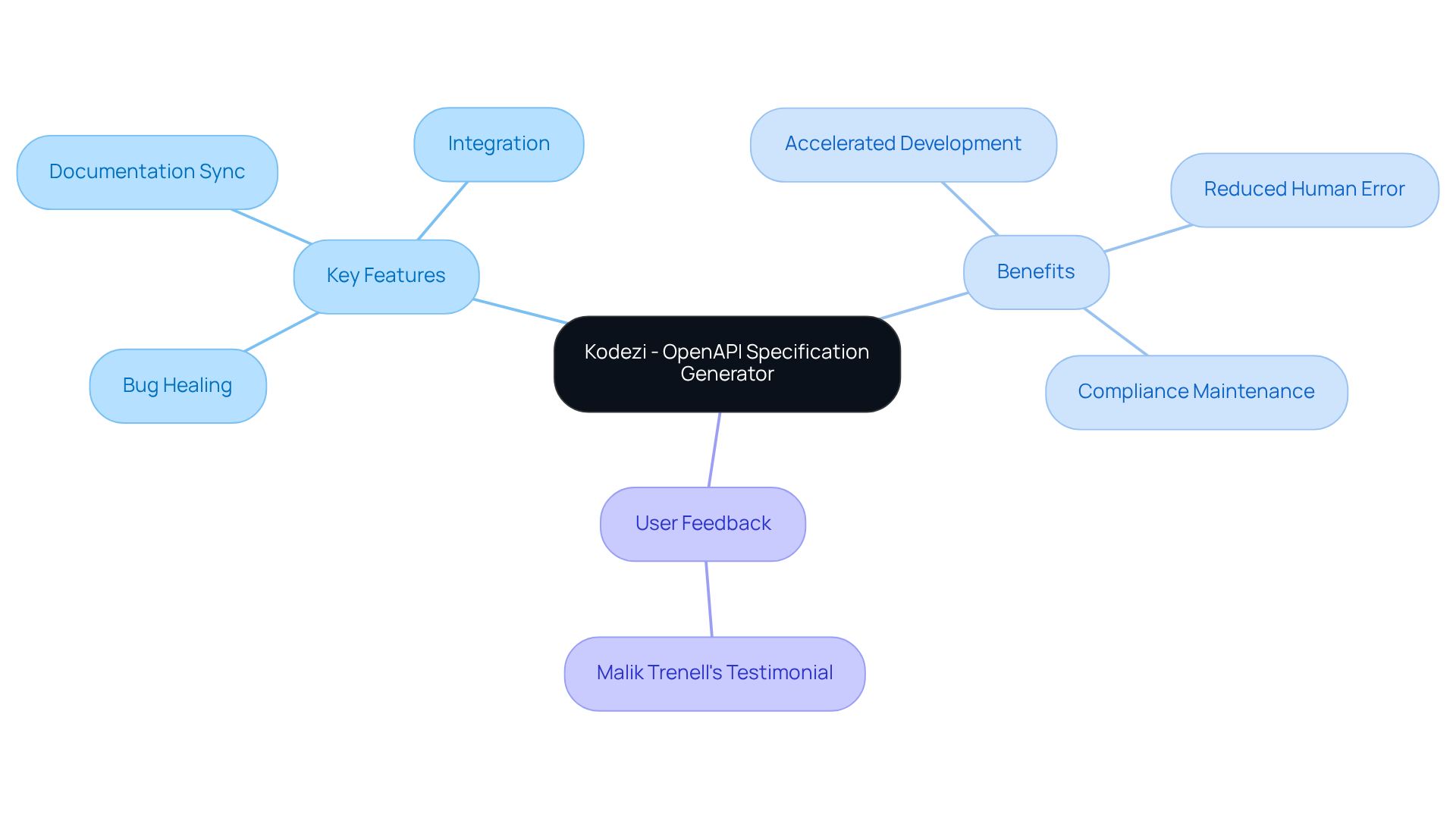
bugbug.io: AI-Powered Debugging Tools for Efficient Software Testing
Coding challenges can be daunting for developers. Kodezi provides a comprehensive suite of AI-driven debugging tools that include AI bug fixes, designed to significantly enhance the software testing process. With features like automated debugging, teams can swiftly recognize and address codebase problems while accessing detailed explanations and insights into what occurred and how to rectify it. This approach enables groups to resolve issues quickly, surpassing conventional debugging techniques.
Furthermore, the platform’s user-friendly interface allows developers to improve code formatting, incorporate exception handling, and ensure adherence to the latest security best practices without requiring extensive coding expertise. This accessibility makes Kodezi suitable for teams with varying skill levels. By automating repetitive testing tasks, the platform drastically reduces the time spent on debugging, allowing developers to focus on more complex challenges.
In fact, developers save 30-60% of their time on coding, test generation, and documentation tasks when utilizing AI tools. This statistic reflects the growing trend of AI adoption in AI bug fixes. Specialists in program testing advocate for automated debugging, emphasizing its capacity to enhance processes and elevate overall application quality.
As AI continues to evolve, Kodezi is transforming how teams approach software testing by implementing AI bug fixes. This ensures faster, more reliable outcomes while underscoring the importance of ongoing testing practices and efficient bug reporting for software longevity. Have you considered how much time your team could save with Kodezi's innovative tools?
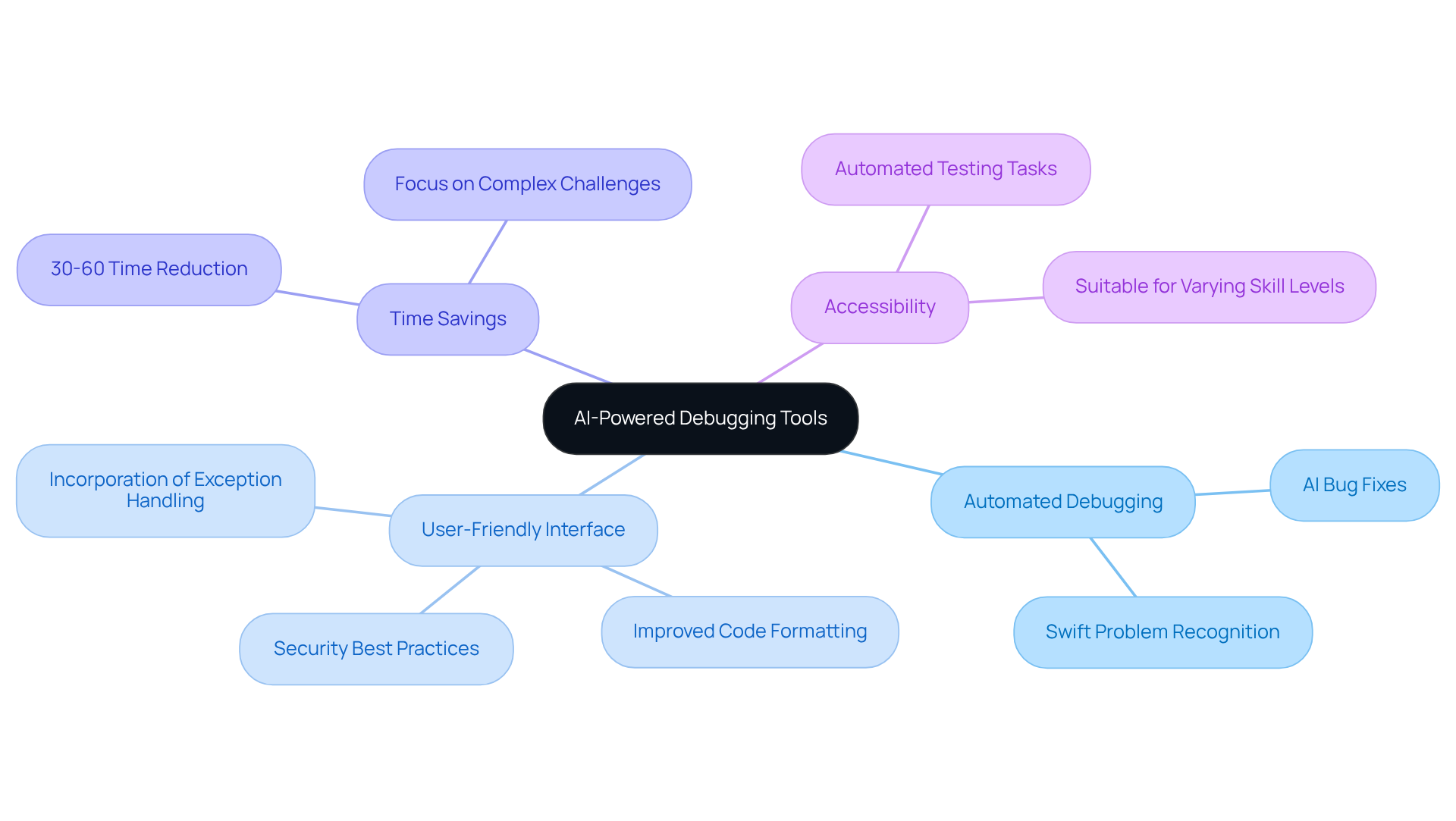
CodeGPT: Context-Aware Bug Fixing for Rapid Issue Resolution
Coding can be a challenging endeavor, often fraught with bugs and issues that disrupt the development process. Fortunately, Kodezi is here to help. This platform utilizes advanced AI algorithms to deliver AI bug fixes, facilitating swift issue resolution. By examining the surrounding programming and grasping the developer's intent, the tool can propose accurate solutions that are more likely to fix the problem without creating new errors.
This capability not only accelerates the debugging process but also enhances the quality of the code produced with AI bug fixes. Developers can depend on this tool to enhance their workflows, enabling them to tackle issues more efficiently and effectively. User testimonials from over 1,000,000 programmers emphasize how the platform has significantly improved debugging efficiency. Many express that using Kodezi feels like discovering a new superpower.
Studies indicate that developers utilizing AI tools can complete tasks up to 56% faster, leading to a notable increase in productivity and job satisfaction. Furthermore, this tool generates regression tests to verify AI bug fixes and prevent bugs from reappearing. It also addresses performance bottlenecks and ensures adherence to the latest security best practices, underscoring its role in maintaining code quality.
Are you ready to revolutionize your coding experience? Explore the tools available on the Kodezi platform and discover how they can transform your development process.
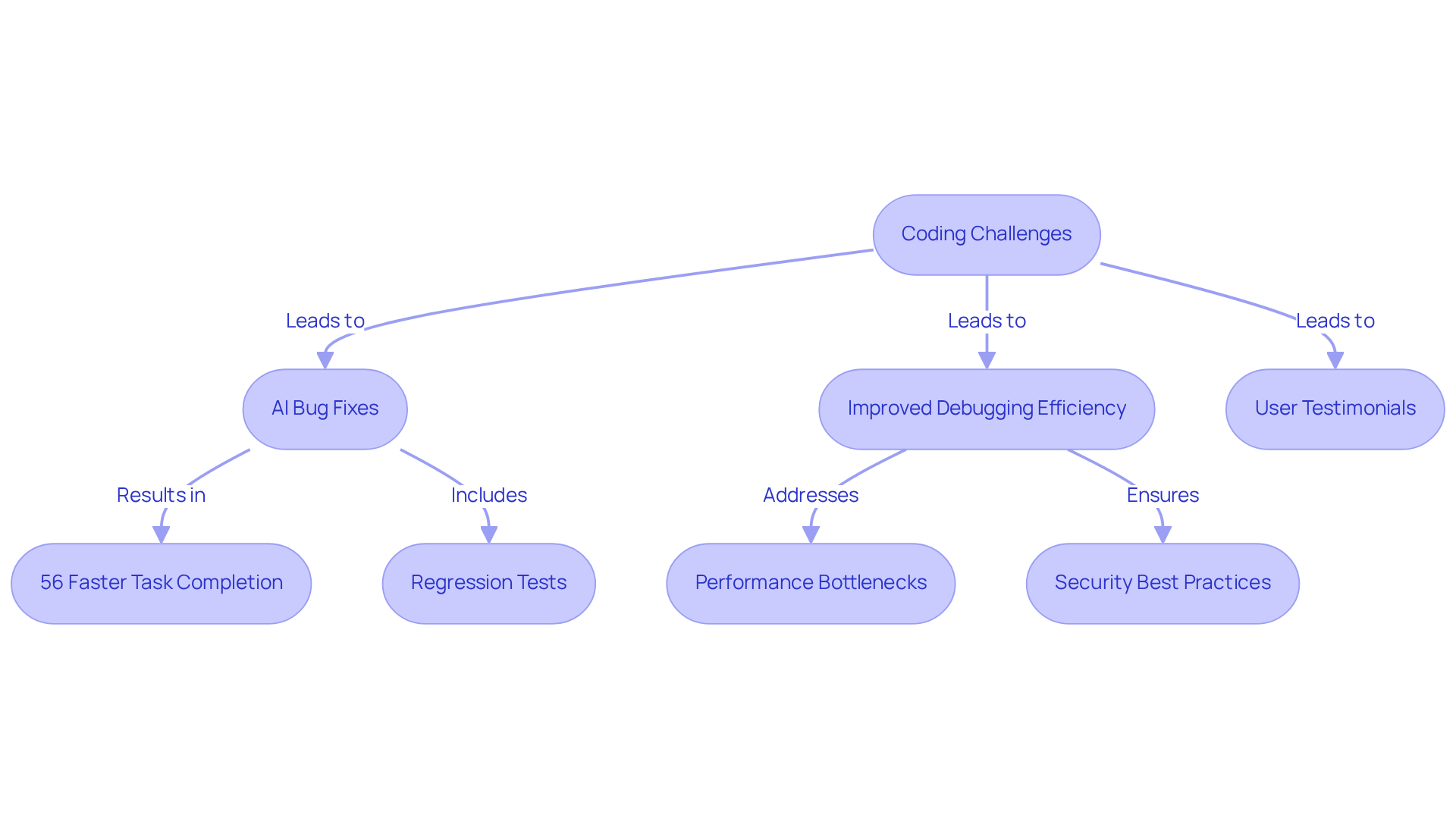
Inspector.dev: AI Bug Fixer for Resource Optimization in Development Teams
Coding challenges can often hinder productivity and frustrate development teams. Kodezi addresses these challenges by focusing on resource optimization for development groups. This innovative AI bug fixes tool independently enhances codebases and resolves issues before they reach production, enabling teams to utilize their resources more efficiently.
By adopting a proactive approach to debugging, Kodezi not only identifies and resolves codebase issues but also provides detailed explanations and insights into AI bug fixes, what went wrong, and how it was resolved. Furthermore, the platform improves performance, guarantees security compliance, and refines formatting. Have you ever wished for a tool that not only fixes bugs but also educates you on best practices? Kodezi offers exactly that.
The integration of Kodezi into your development workflow can lead to significant improvements in team productivity and morale. Developers can trust that their code is being monitored and maintained efficiently, allowing them to concentrate on higher-priority tasks. Imagine a work environment where your team can focus on innovation rather than troubleshooting—this is the potential Kodezi unlocks.
In addition, Kodezi's features enhance code quality and streamline processes. By exploring the tools available on the platform, you can transform your coding practices and elevate your team's performance. Why not take the first step towards a more efficient development process? Discover Kodezi today and experience the difference.
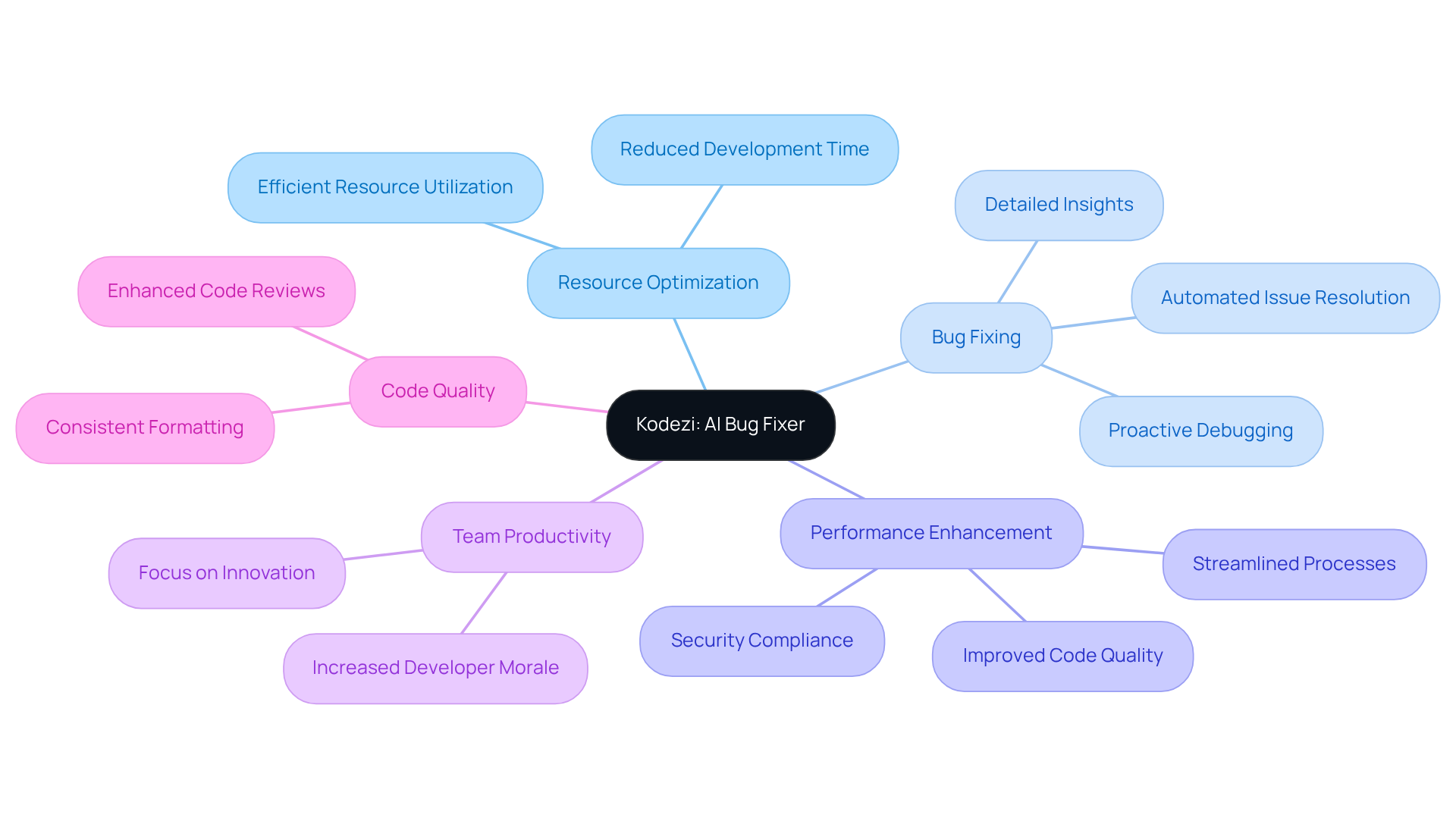
Ful.io: AI Bug Fixing Tools for Faster Error Detection
In the fast-paced world of application development, coding challenges can significantly hinder progress. Ful.io tackles these challenges directly with tools for AI bug fixes that enhance the speed of error detection. By leveraging advanced machine learning algorithms, Ful.io swiftly identifies potential issues within the codebase, allowing developers to tackle them before they escalate into larger problems.
This rapid detection capability not only boosts product quality but also accelerates the overall development timeline. Teams utilizing Ful.io can anticipate a substantial improvement in their ability to deliver high-quality products on schedule. Reports indicate that the use of AI bug fixes can reduce debugging time by as much as 47%.
Furthermore, industry leaders emphasize that incorporating machine learning into development processes is essential for maintaining a competitive edge. By streamlining workflows and enhancing productivity, organizations using Ful.io's solutions are well-prepared to meet the demands of modern development. They can reduce downtime and improve efficiency, ensuring that their projects remain on track.
Are you ready to transform your development process? Explore the tools available on Ful.io and experience the benefits of AI bug fixes for yourself.
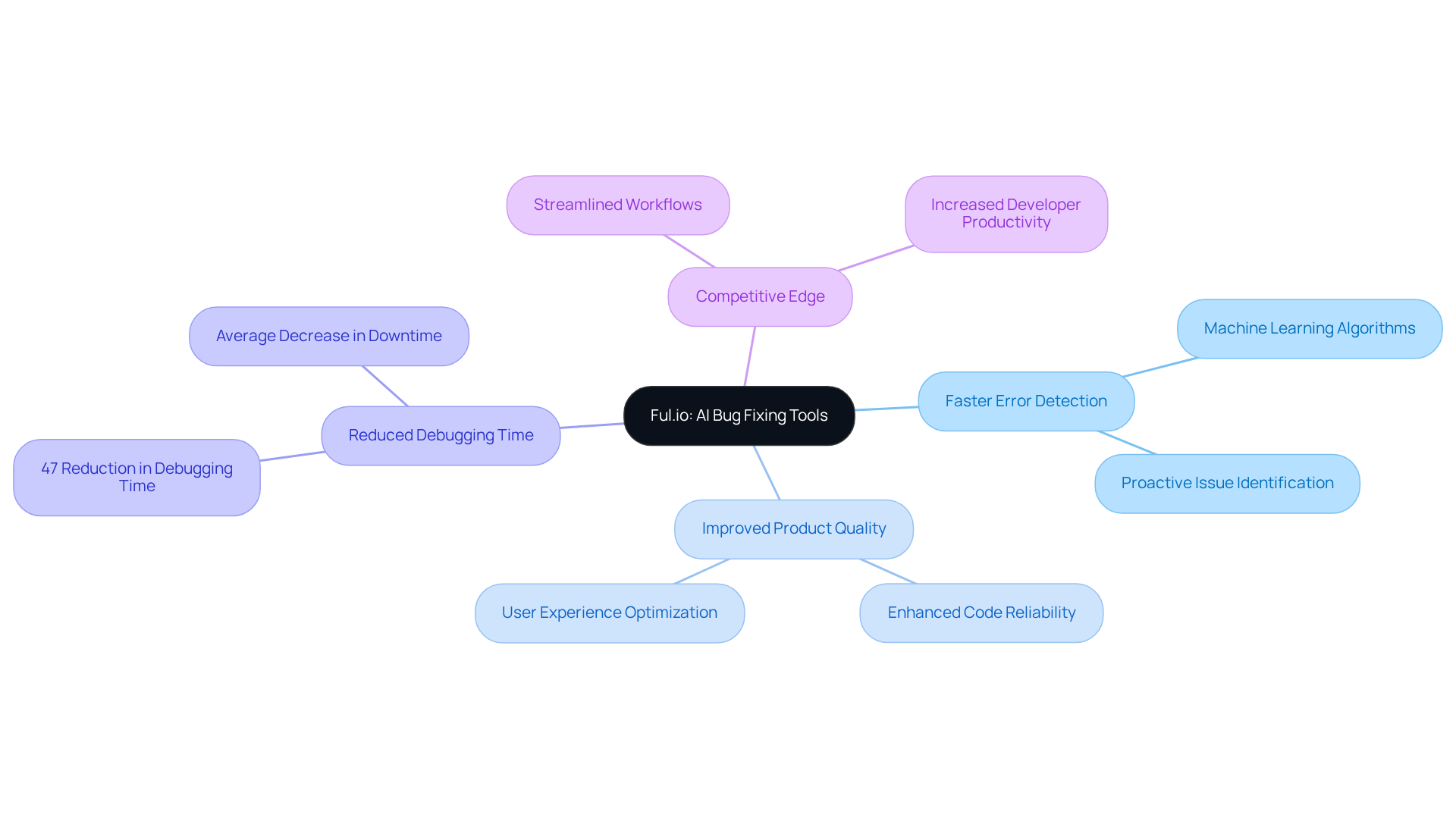
Google Research: AI-Powered Patching for Automated Vulnerability Fixes
In today’s fast-paced development landscape, developers face significant challenges in maintaining secure applications. Google Research has pioneered AI-driven patching solutions that implement AI bug fixes to automate the identification and remediation of vulnerabilities in applications. By leveraging advanced algorithms to analyze code patterns and historical data, these AI systems can detect potential security flaws and autonomously apply necessary patches.
This automation not only significantly enhances the security stance of applications but also supports AI bug fixes, alleviating the burden on development teams. Consequently, teams can concentrate on innovation rather than routine maintenance tasks. In fact, studies indicate that AI systems can automatically perform AI bug fixes for up to 80% of identified vulnerabilities. This underscores the critical role of such technologies in today’s development environment.
As cybersecurity expert Vinugayathri Chinnasamy notes, "The evolution of cybersecurity threats necessitates the adoption of automated solutions to keep pace with emerging vulnerabilities." The incorporation of AI-driven patching, which includes AI bug fixes, is not merely a trend; it is becoming vital for organizations striving to uphold strong security in their development processes.
Are you ready to explore how these solutions can transform your approach to application security?
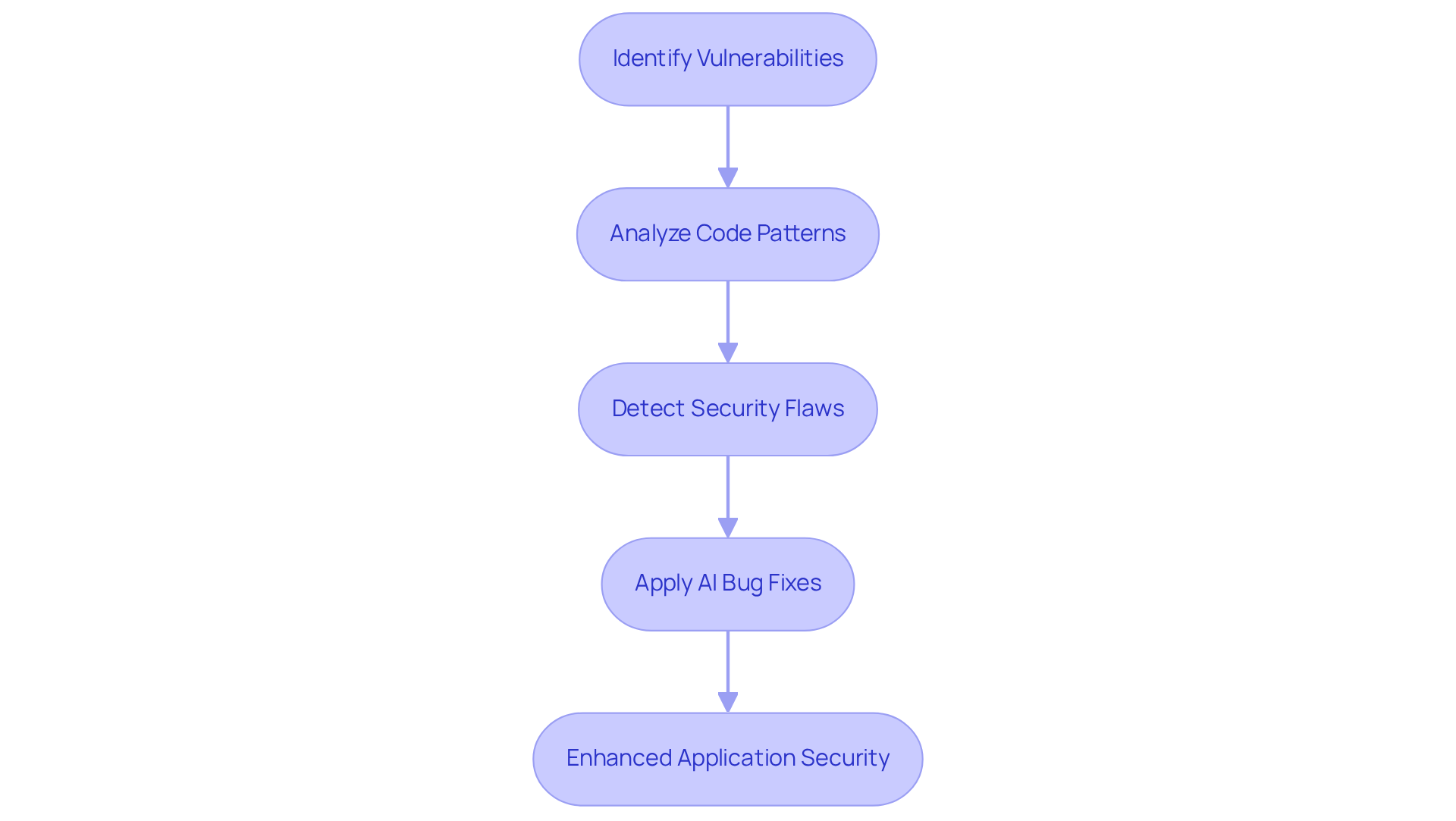
Medium Insights: Using Coding Agents for Effective Production Bug Fixes
Developers often face significant coding challenges, particularly when it comes to bug fixes in production environments. Medium Insights highlights a growing trend: the use of coding agents designed to independently detect and resolve issues as they arise. This approach minimizes user impact and preserves system stability.
Kodezi stands out in this landscape, leveraging AI technologies to analyze production data and implement real-time solutions. It not only identifies bugs but also provides detailed explanations of the encountered problems, ensuring that applications remain functional and secure. Furthermore, Kodezi addresses performance bottlenecks, adds exception handling, ensures security compliance, and enhances code formatting.
The benefits of using Kodezi are substantial. Organizations can enhance their service reliability and customer satisfaction by adopting this proactive approach to bug fixing. Imagine improving productivity and code quality while reducing the time spent on troubleshooting.
Are you ready to transform your coding practices? Explore the tools available on the Kodezi platform and see how they can elevate your development process.
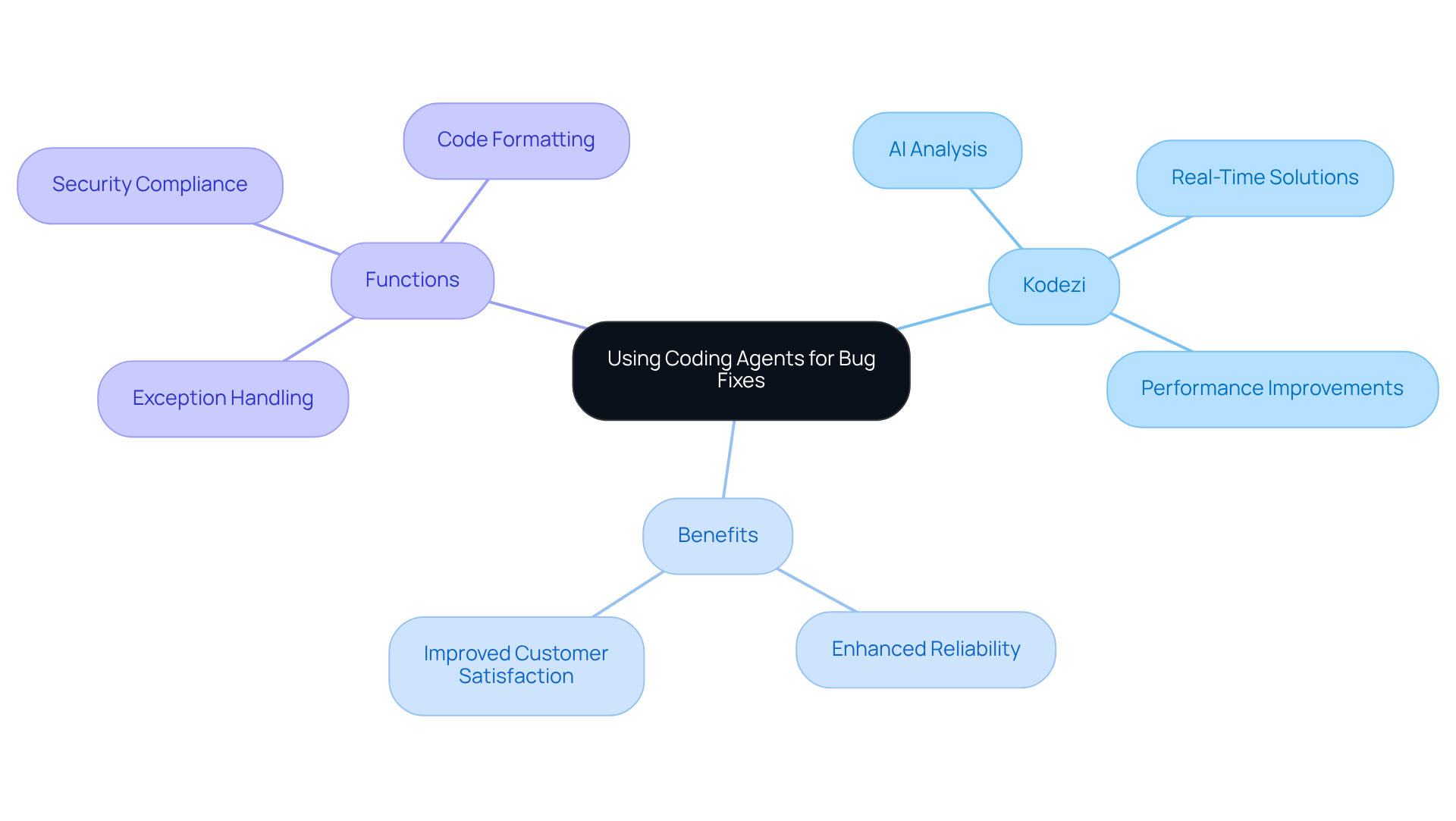
bugbug.io: AI in Software Testing for Intelligent Test Design
Software testing presents numerous challenges for developers, particularly in ensuring comprehensive coverage and minimizing bugs. bugbug.io addresses these challenges head-on by leveraging AI bug fixes to revolutionize the testing process through intelligent test design. By meticulously analyzing historical test data and application behavior, bugbug.io generates optimized test cases that encompass a wider array of scenarios.
This advanced capability significantly enhances test coverage, with organizations reporting an average improvement of up to 85% in coverage when utilizing AI bug fixes for generating test cases. Furthermore, the automation of test creation reduces the time spent on manual processes, allowing development teams to focus on critical tasks. For instance, optimized test cases have been shown to identify high-risk areas in the program, which has resulted in a significant decrease in AI bug fixes during production.
As Arun Kumar, a Business Development Director at TestFort, notes, "AI enhances humans. Successful implementations use AI for repetitive tasks, freeing testers for complex scenarios." This integration not only ensures thorough testing before release but also contributes to a superior user experience by minimizing the likelihood of defects in the final product.
Moreover, the AI from this platform facilitates AI bug fixes as part of the development lifecycle, ensuring that automated testers identify bugs before they proliferate. This proactive approach enhances quality with each release. Are you ready to explore how bugbug.io can transform your software testing process?
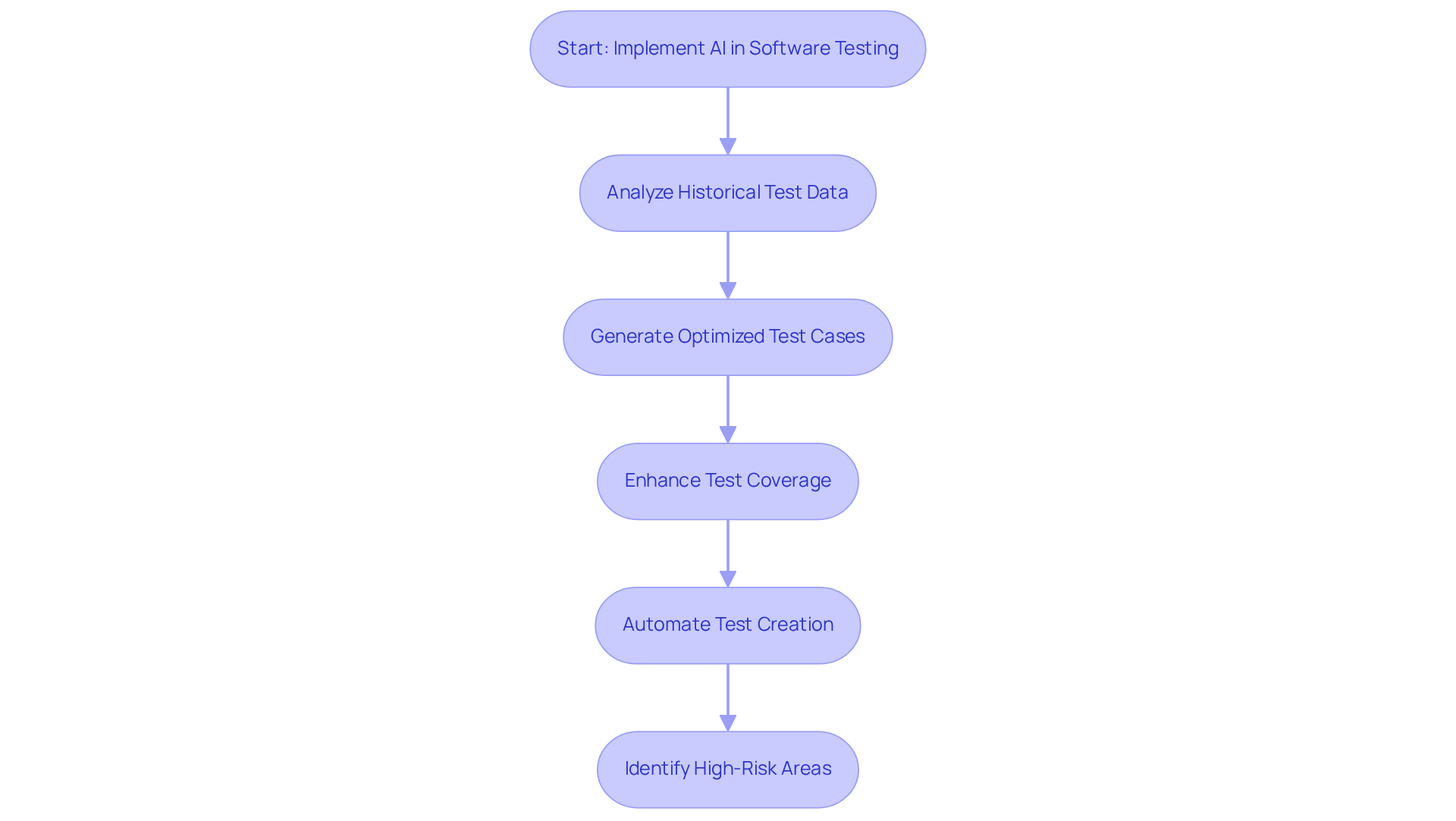
The Rise of Autonomous Testing: Transforming Bug Fixing Approaches
The rise of autonomous testing is reshaping the landscape of software development, particularly in how developers tackle common coding challenges. Traditional bug fixing approaches are being transformed by systems that operate independently to identify and resolve AI bug fixes. These systems harness the power of AI and machine learning, continuously monitoring applications to detect anomalies and implement AI bug fixes without requiring human intervention.
How does Kodezi fit into this evolving picture? The automated debugging tool exemplifies this shift, enabling developers to swiftly identify and rectify issues within their codebase. It not only offers detailed explanations of what occurred but also outlines how the issues were addressed. This capability not only accelerates the process of AI bug fixes but also enhances the overall quality of applications by ensuring that problems are resolved in real-time.
Furthermore, Kodezi's CLI autonomously enhances code quality by utilizing AI bug fixes to address bugs before they reach production. It optimizes performance, enhances code formatting, and ensures compliance with the latest security best practices. As autonomous testing becomes more prevalent, development teams are encouraged to adapt their workflows to leverage these innovative solutions. This ultimately results in more efficient and dependable application development.
Are you ready to enhance your coding practices? Explore the tools available on Kodezi's platform to experience the benefits of improved productivity and superior code quality firsthand.
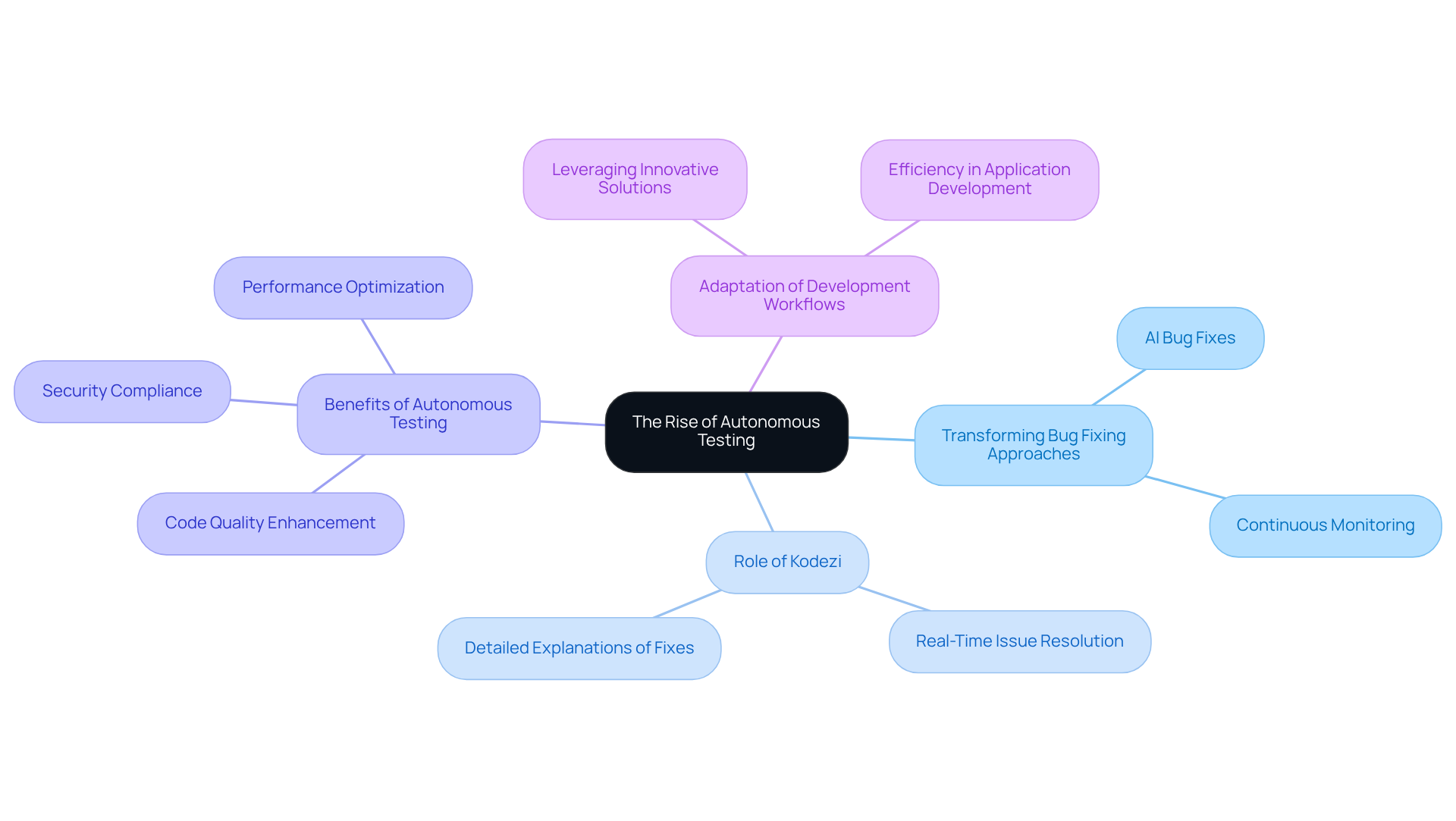
AI-Driven Test Automation: Revolutionizing Software Testing Workflows
AI-driven test automation is revolutionizing software testing workflows by enhancing efficiency and streamlining processes. Are you facing challenges with repetitive tasks in testing? By automating activities such as test case generation, execution, and reporting, AI tools enable teams to focus on more strategic aspects of testing. This shift not only accelerates the testing cycle but also significantly improves accuracy by reducing human error. For instance, AI can execute test cases up to three times faster than traditional methods, allowing for quicker feedback loops and more rapid iterations.
Furthermore, Kodezi's automated debugging capability addresses these challenges by enabling teams to quickly pinpoint and resolve codebase issues. This feature offers comprehensive insights into the problems encountered and their solutions. It effectively tackles performance bottlenecks, uncovers security vulnerabilities, and enhances code formatting, all while ensuring compliance with the latest security best practices. As organizations increasingly embrace AI-driven solutions, the testing landscape evolves, necessitating AI bug fixes, which lead to faster releases and higher-quality products.
Industry leaders emphasize that automation has taken over more than 50% of manual testing for many teams, highlighting the essential role of AI in contemporary QA practices. With 78% of software testers incorporating AI into their workflows, the momentum towards automated testing continues to grow. To stay competitive, teams should consider integrating Kodezi's innovative features into their processes, promising a future where efficiency and quality are paramount.
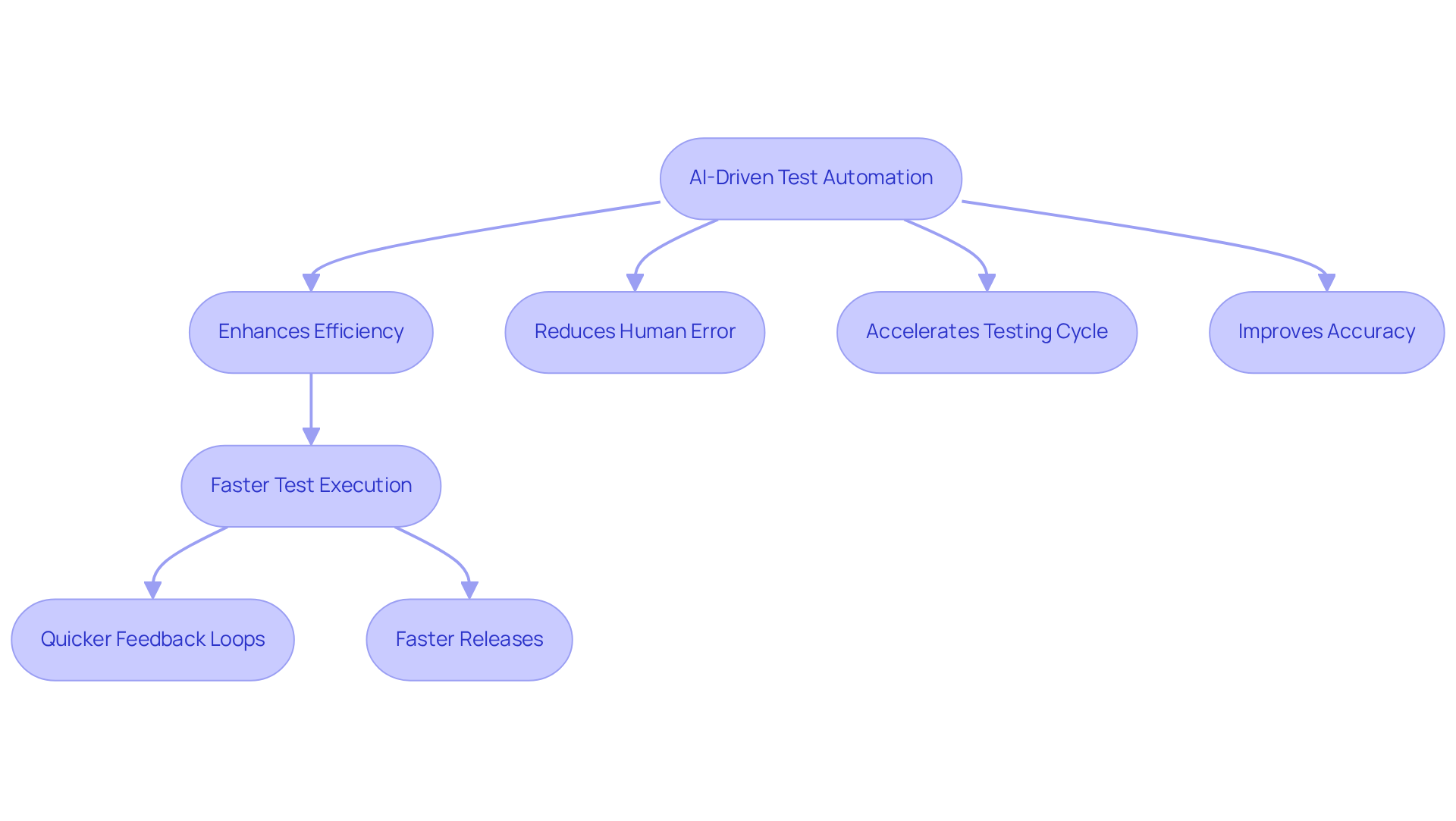
Conclusion
The integration of AI bug fixing tools into software development represents a transformative shift that enhances productivity and code quality. Developers often face significant coding challenges that can hinder their progress. How can these challenges be effectively addressed? Platforms like Kodezi and bugbug.io streamline the debugging process, allowing development teams to focus on innovation rather than troubleshooting. This proactive approach to coding challenges ensures that issues are addressed before they escalate, ultimately leading to more efficient workflows and higher-quality software products.
Moreover, key insights have emerged regarding the substantial benefits of AI in bug fixing. Kodezi's robust features for automated debugging and bugbug.io's intelligent test design capabilities significantly reduce debugging time and improve overall software quality. Did you know that developers can save considerable time and effort, with some tools allowing for task completion up to 56% faster? Furthermore, the emphasis on security compliance and performance optimization highlights the critical role these technologies play in maintaining a competitive edge in the fast-paced development landscape.
As AI continues to evolve, embracing these innovative solutions becomes essential for development teams aiming to enhance their efficiency and effectiveness. The future of software development is undoubtedly intertwined with AI technologies. Organizations must explore and implement these tools to improve their coding practices and remain at the forefront of industry advancements. By doing so, teams can deliver superior products that meet the demands of today's market.
Frequently Asked Questions
What is Kodezi and what does it do?
Kodezi is a professional OpenAPI specification generator that automates AI bug fixes and enhances software quality. It integrates with existing development environments to help engineering teams focus on building software rather than troubleshooting.
How does Kodezi improve code quality?
Kodezi detects and corrects codebase issues before deployment, ensuring updates adhere to security best practices and programming standards. Its automation reduces human error and accelerates development, making it essential for modern engineering teams.
What are the key features of Kodezi?
Key features include Bug Healing, Documentation Sync, automated debugging, and a user-friendly interface that supports various programming languages. Kodezi also offers a '5 minute quickstart' and demonstration options for easy onboarding.
How much time can developers save by using Kodezi?
Developers can save 30-60% of their time on coding, test generation, and documentation tasks when utilizing Kodezi's AI tools, significantly enhancing their productivity.
What benefits does Kodezi provide for software testing?
Kodezi enhances the software testing process by allowing teams to swiftly recognize and address codebase problems, providing detailed insights into issues, and automating repetitive testing tasks.
How does Kodezi's AI bug fixing work?
Kodezi uses advanced AI algorithms to examine surrounding programming and understand the developer's intent, proposing accurate solutions that fix issues without introducing new errors.
What impact does Kodezi have on developer productivity?
Developers using Kodezi can complete tasks up to 56% faster, leading to increased productivity and job satisfaction, as well as improved debugging efficiency.
Can Kodezi support teams with varying skill levels?
Yes, Kodezi's user-friendly interface and automated features make it suitable for teams with varying levels of coding expertise, allowing everyone to improve code quality and adhere to best practices.




